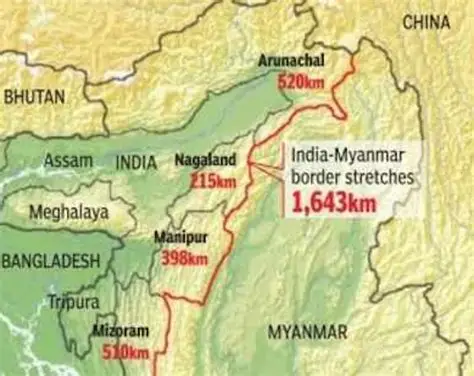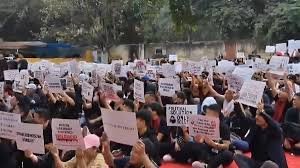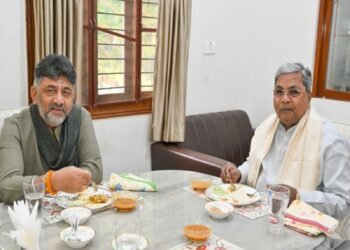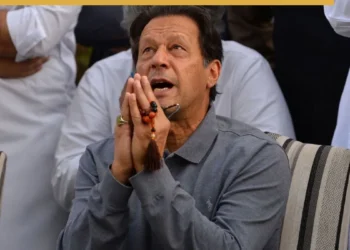Editor’s Note : As part of our ongoing commitment to serve as an advocacy platform for peace in Manipur, we continue to welcome opinion pieces from all communities. We encourage individuals to use this space to express their perspectives with sincerity and responsibility. We urge contributors to refrain from language that could be interpreted as inciting violence or hatred.In line with this initiative, we present a write-up by H.S. Benjamin Mate, Chairman of the Kuki Organisation for Human Rights Trust (KOHUR). The views expressed are his personal, and ThePowerCorridors.in neither endorses nor denies them. Please mail your write-up to: novinkn@gmail.com
By H.S. Benjamin Mate
The Indo-Myanmar border—particularly across the states of Nagaland, Manipur, and Mizoram—has long remained unfenced, in recognition of the region’s unique ethnographic and socio-political realities. Indigenous communities such as the Nagas and the Kuki-Chin-Mizo peoples straddle both sides of the border, sustaining centuries-old familial, cultural, and territorial ties that predate modern nation-states.
However, recent political developments in Manipur expose a striking hypocrisy among Meitei political elites, most notably former Chief Minister N. Biren Singh. This article critically interrogates the Meitei leadership’s shifting position on border fencing—from strong opposition in the early 2000s to aggressive advocacy post-2023—revealing a pattern of ethnic opportunism, historical revisionism, and institutionalised bias against the state’s indigenous hill communities.
The Indo-Myanmar boundary, formalised in the postcolonial aftermath of Indian and Burmese independence in 1947 and 1948 respectively, arbitrarily bisected the ancestral territories of numerous indigenous peoples. For the Kuki-Zo, Naga, and Mizo communities, these cartographic impositions disrupted organic patterns of kinship, culture, mobility, and economic exchange that had evolved over centuries.
READ: The Breaking Point: Why Kuki CSOs Are Threatening to Shut Down Manipur’s Lifeline
To partially accommodate these lived realities, the Government of India instituted the Free Movement Regime (FMR), allowing members of borderland communities to travel freely within 16 kilometers on either side. The absence of fencing was not an administrative oversight but a conscious recognition of the region’s complex ethnic geography.
A Narrative Shift
In recent years, however, this nuanced understanding has been replaced by an aggressive, security-driven narrative—one increasingly shaped by Meitei political actors who have sought to manipulate border policy for ethnopolitical consolidation. This article traces the trajectory of that shift, exposing its deeply prejudiced underpinnings.
Kuki-Zo Support for Fencing: Clarifying the Context
Contrary to recent portrayals by sections of the Meitei media and political establishment, the Kuki-Zo community has historically supported targeted border fencing—provided it addressed legitimate security concerns and did not disrupt transborder ethnic ties indiscriminately.
In the early 2000s, as Meitei insurgent groups faced sustained counter-insurgency operations in the Imphal Valley, many fled to Myanmar to regroup. These groups, finding no support in the Kuki-inhabited hill districts, began establishing operational bases across the border, particularly near the town of Moreh—historically a Kuki settlement.
Over time, these insurgents exerted coercive control over local trade in Moreh, intimidating Indian traders—including Tamils, Punjabis, and Biharis—and facilitating the cross-border trafficking of arms, drugs, and militants. Alarmed by the deteriorating security situation, Kuki civil society organisations in Moreh actively called for fencing in and around the town to stem criminal activity. Village chiefs along the border even issued No Objection Certificates (NOCs) to facilitate the effort.
Responding to this consensus, the Congress-led Union Government initiated fencing near Moreh in 2004. Far from being a unilateral imposition, this measure enjoyed broad-based support from the tribal populace. This episode decisively refutes the claim that the Kuki-Zo have historically opposed border regulation; rather, their advocacy has been principled and context-driven.
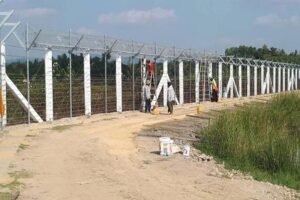
Meitei Obstructionism: A Documented Case of Hypocrisy
Despite the broad consensus among hill communities, the fencing initiative was met with fierce resistance from Meitei political leaders and civil society groups. At the forefront of this opposition was N. Biren Singh, then a Cabinet Minister in the Manipur Congress Government. He claimed that the fencing would result in a “loss of Manipur’s land” to Myanmar—an assertion entirely unfounded in legal, demographic, or geographic terms, given that Meiteis neither inhabited nor owned land along the Indo-Myanmar border.
To legitimise his opposition, Biren Singh engineered a proxy protest movement through an NGO—Information Centre for Hill Areas Manipur (ICHAM)—co-opting a handful of Naga and Kuki figures to project a façade of pan-ethnic dissent. This cynical strategy was soon backed by powerful Meitei organisations such as the All Manipur United Clubs Organisation (AMUCO) and United Committee Manipur (UCM). These groups framed the fencing as a threat to Manipur’s “territorial integrity” and mobilised sustained public protests.
Succumbing to this pressure, the Government of India suspended the fencing work. Ironically, these same actors would later reverse their stance entirely—advocating for complete fencing when it aligned with their new political interests. This documented duplicity reveals that their opposition was never about sovereignty, but strategic utility.
The 2023 Pogrom and the Strategic U-Turn
The Meitei double standard on border fencing reached its apex in the aftermath of the May 3, 2023 pogrom—widely recognised as a state-sponsored campaign of ethnic cleansing against the Kuki-Zo community. The violence resulted in mass killings, the destruction of tribal settlements, and the forced displacement of over 60,000 people from the Imphal Valley.
READ: Rahul Gandhi Drops ‘Atom Bomb’: Alleges LS Polls Were Rigged
Facing mounting criticism and calls for his resignation, N. Biren Singh rebranded himself before the Union Government as a staunch nationalist. In a calculated pivot, he now demanded:
• The complete fencing of the Indo-Myanmar border
• The abolition of the Free Movement Regime (FMR)
This radical reversal served dual objectives:
• Political Survival: Aligning with the BJP-led Union Government’s national security discourse enabled Singh to reassert his political relevance.
• Ethnic Fragmentation: By curtailing transborder mobility, the policy sought to sever cultural, familial, and political bonds of the Kuki-Zo and Naga peoples—communities with strong kinship networks in Myanmar.
Tragically, the Union Ministry of Home Affairs approved these measures without consulting the directly affected communities in Manipur, Nagaland, or Mizoram. In early 2024, the FMR was officially suspended, and plans for full-scale border fencing were announced—marking a dangerous shift toward coercive border management rooted in ethnic majoritarianism.
Weaponising Borders, Undermining Unity
The Meitei political establishment’s contradictory positions on border fencing exemplify a broader trend of ethnic majoritarianism cloaked in nationalist rhetoric. Their historical opposition to fencing—when it did not serve their strategic interests—stands in stark contrast to their present-day advocacy, which aims to suppress the collective agency of indigenous hill communities.
Border fencing in ethnically complex regions like the Indo-Myanmar frontier cannot be approached through simplistic security paradigms. It demands culturally sensitive, participatory policymaking that respects the histories and rights of the people who live there. Any unilateral imposition—especially by actors with compromised legitimacy such as N. Biren Singh—will only deepen existing fractures and escalate instability.
READ: Supreme Court Junks Justice Yashwant Varma’s Plea
The Government of India must resist politically expedient, ethnically motivated demands. Instead, it must uphold its constitutional responsibility to ensure equity, justice, and dignity for all citizens—particularly those in its most vulnerable and marginalised borderlands.
Archival Sources Referenced
- “UCM opposes Indo-Myanmar fencing,” Imphal Free Press, July 2014
• “Border fencing to cost Manipur 10 km of land: UCM,” The Hindu, March 2017
• “AMUCO, UCM demand halt to fencing work,” The Northeast Today, 2017


